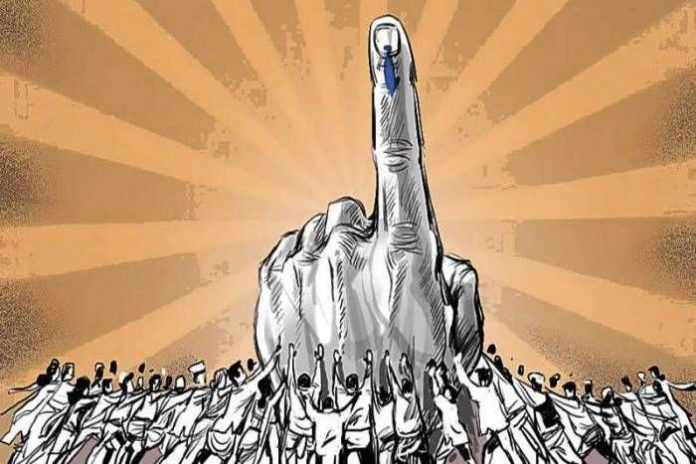Mohd Haider
Ever since late President Pranab Mukherjee mentioned ‘One Nation One Election’ in his speech in 2017, the subject has been a part of political debates time and again. A high-level committee under former President Ram Nath Kovind recently produced a voluminous report supporting the Saffron party’s idea of simultaneous election in India. This has resurrected the fire of ‘One Nation One Election’ in political debates. Amid all the speculations of implementing a synchronized Lok Sabha and Assembly election, the Law Commission has already informed that the agency is working on the formula so that all the state and Lok Sabha polls can be held together from 2029 onwards.
Though the Bhartiya Janta Party has placed some serious grounds on which simultaneous election can be regarded as a better option for the electoral cycle, it raises serious concerns about the federal structure of the country as this might result in the Union election overshadowing the State election. BJP claims simultaneous election would reduce the financial burden on the State exchequer but has not taken the reduction of feedback mechanism into account which would be a result of an assured fixed term that would lead to autocratic tendencies. However, such an election process will definitely reduce the duration of the ‘Model Code of Conduct’, which would prevent the stalling of development work for months and ensure the continuation of Government policies and programs. The domination of national issues will unquestionably be a disadvantage for regional parties. Addressing local issues would also be difficult in political narratives.Thus, competing against national parties in concurrent elections will in both money and election strategy be a significant challenge.
Simultaneous election would also require several constitutional amendments to sync the terms of various state assemblies requiring the center to curtail or extend the terms of several state assemblies. This in itself would be a significant challenge for the government.
One Nation One Election would also be a threat to internal security as deploying security forces for simultaneous elections is a logistic challenge and might endanger the internal security in the country. Exclusion of local elections would also need a separate exercise and thus this will reduce the gains of simultaneous elections. However, concurrent elections are expected to increase administrative efficiency, as the process of a fair and free election process impacts everyday administration because officials engage in polling duties.
Current Situation
Arjun Ram Meghwal, Union Law and Justice Minister introduced The Constitution Bill, 2024 in Lok Sabha on 16th December, after it was approved by the Union Cabinet on12th December. This is the one hundred and twenty-ninth amendment (129th amendment). BJP-led NDA (National Democratic Alliance) has welcomed the bill, claiming it as a resource-saving option. Prime Minister Narendra Modi praised the One Nation One Election initiative, as a significant step towards enhancing India’s democracy and streamlining the electoral process.
The Constitution Bill 2024 (129th amendment) states the President will notify the appointed date on the first sitting of Lok Sabha after a general election (expected to be 2029), from when the provisions of the amendment will come into effect. It also highlights that even if the term of Legislative assemblies is deferred from Lok Sabha, it shall come to an end notwithstanding anything in Article 172 of the constitution. In cases where Election Commission has the opinion that the election for the particular State Assembly cannot be held as part of simultaneous election, it may make recommendation to the President accordingly.
As the bill approached parliamentary consideration, various opposition leaders have expressed their concerns on this. Senior Congress leader Digvijay Singh questioned the proposal, highlighting the possibility that if a state government loses its majority shortly after elections, how would such an arrangement work. Chief Minister of J&K Omar Abdullah and his party, National Conference (NC) have called for a transparent and open discussion on the One Nation One Election initiative. President of the People’s Democratic Party (PDP) and former CM of J&K Mehbooba Mufti stated the simultaneous elections would undermine the federal structure of the country. Veteran MLA of the Communist Party of India (Marxist), have also opposed the move proclaiming the proposal is against the spirit of the federal structure that gives protection to the country’s huge diversities.
One Nation One Election policy also contradicts the Supreme Court verdict given in SR Bomanni vs UOI case, 1994, where the apex court declared that states have an independent constitutional existence and they have a political, social, educational, and cultural life of people as ‘Union’. The federalism in the Indian constitution is a matter of principle, not administrative convenience.
The current political discourse and the blazing debates between the ruling bloc and opposition leaders make it empirical that the proposal if passed will have a significant impact on the electoral behavior and electoral cycle of the country. The BJP also needs to understand to have an effective and efficient electoral exercise merely streamlining them will not produce actual results, the ruling party and opposition will have to come together to assess if the nation needs any such policy. If yes, this would require unprecedented political support from various stakeholders at all levels. Facing severe opposition from some parties, the Bill has been submitted to JPC for further evaluation.
Trending Now
E-Paper


